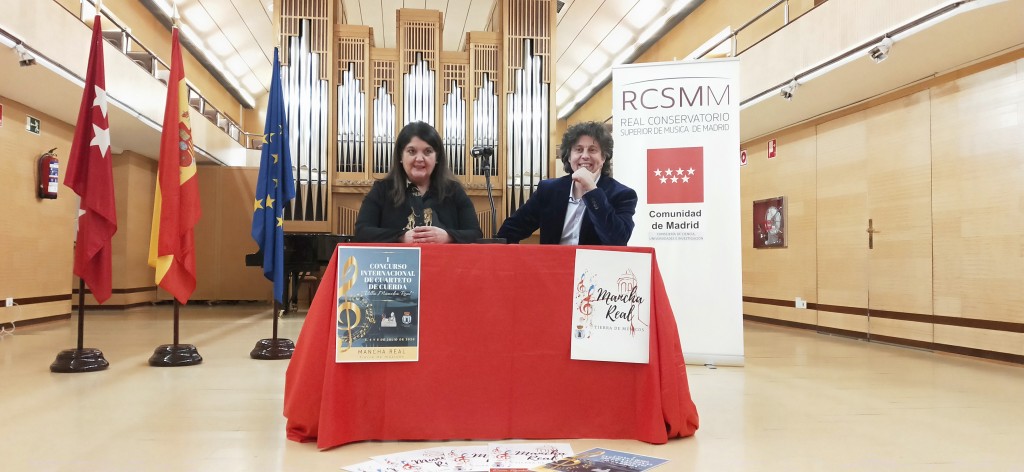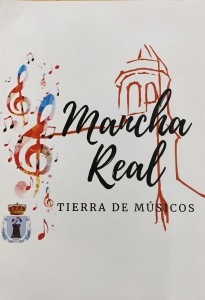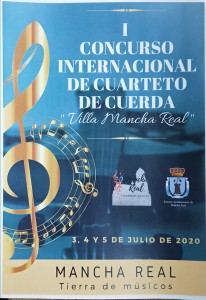It is the first one of its kind in Spain. And it is also the first time that the most classical ensemble in classical music has its own international competition in Spain: the string quartet, the four instrumental voices par excellence. It has been already over four hundred years that Spanish writer Miguel de Cervantes started writing his world famous novel Don Quixote having no desire to call to mind the name of a village of La Mancha. Today, however, 415 years after the publication of Cervantes first part of Don Quixote, I beg the reader to call to mind the name of this other place: Mancha Real. Ladies and gentlemen, ¡the 1st International String Quartet Competition “Villa de Mancha Real” has been born! Please, do not get mixed up! Mancha Real is not a Castilian village like Don Quixote’s, but an Andalusian one near the city of Jaén. The people from Mancha Real are known as mancharrealeños —yes, I know, hard to pronounce in English, give a try if you can! Our book would start like this: “In a village of Andalusia, the name of which I’ll always have desire to call to mind, there lives a mayoress determined to show the world that in the village of Mancha Real there are loads of talent, hospitality and future. A land of musicians and olive groves, arisen from a ‘spot’ (that is the meaning of ‘mancha’ in English) of pine trees and ‘royal’ (that is what ‘real’ means in Spanish) because one day a king passed by and found solace and sustenance in the village, the former Manchuela de Jaén (Little Spot of Jaén) became the Royal Spot (Mancha Real) of today. And the most royal string quartets, the best of sounds and most beautiful melodies will arise from this land on the foothills of Sierra Mágina.”

Mancha Real mayoress María del Mar Dávila and maestro Cristóbal Soler. Madrid, January 2020.
On Monday 20th January 2020, Maria del Mar Dávila, the mayoress of Mancha Real, travelled to Madrid to officially present the 1st International String Quartet Competition “Villa de Mancha Real”. Next to her was the orchestra conductor and maestro Cristóbal Soler, founder of this competition, who had also travelled from Valencia to Madrid for the presentation. Will this be a “quixotic” undertaking of the 21st century? The place chosen for the presentation was the Madrid Royal Conservatoire of Music. It was five in the afternoon, exactly five o’clock in the afternoon. Very few people, hardly anyone. Maestro Soler sadly expresses his disappointment to the deputy director of the conservatoire —maybe the one to blame for not spreading the news among professors and students. Will it be a sign of how arduous and quixotic this wonderful undertaking is? Never mind! The mayoress and the maestro do not flinch and they go on with the presentation of this new international competition in Spain. Both of them are aware that a ‘baby’ needs to be pampered since it is in the parent’s belly.
 The mayoress of Mancha Real speaks about the hospitality of the mancharrealeños —Come on! Pronounce it and get it right if you dare!—, she talks about the history and wonders of this Andalusian village, near Jaén. Just a little over 11.000 inhabitants, Mancha Real has a great musical tradition. Maria del Mar Dávila talks with pride and joy about their typical “andrajos”, a tradicional stew made with flour, about their sweet “papajotes” for Easter Week, about their “risor”, a coffee brandy from the region, about their precious and exquisite olive oil and their prosperous wood and furniture industry —by the way, Mancha Real has one of the lowest rates of unemployment in Spain. The mayoress can’t help mentioning the Iglesia de San Juan Evangelista (St. John the Evangelist Church), the symbol of this village. She also reveals a future plan to make the Carmelite Convent founded by St. Juan de la Cruz —the author of the Spiritual Canticle: silent music, sounding solitude— into a theatre. Will it be the venue for future editions of the International String Quartet Competition “Villa de Mancha Real”?
The mayoress of Mancha Real speaks about the hospitality of the mancharrealeños —Come on! Pronounce it and get it right if you dare!—, she talks about the history and wonders of this Andalusian village, near Jaén. Just a little over 11.000 inhabitants, Mancha Real has a great musical tradition. Maria del Mar Dávila talks with pride and joy about their typical “andrajos”, a tradicional stew made with flour, about their sweet “papajotes” for Easter Week, about their “risor”, a coffee brandy from the region, about their precious and exquisite olive oil and their prosperous wood and furniture industry —by the way, Mancha Real has one of the lowest rates of unemployment in Spain. The mayoress can’t help mentioning the Iglesia de San Juan Evangelista (St. John the Evangelist Church), the symbol of this village. She also reveals a future plan to make the Carmelite Convent founded by St. Juan de la Cruz —the author of the Spiritual Canticle: silent music, sounding solitude— into a theatre. Will it be the venue for future editions of the International String Quartet Competition “Villa de Mancha Real”?
 On the other hand, maestro Cristóbal Soler says that he loves being close to young musicians, because he learns a lot from them. Actually, he is the conductor who collaborates the most with the Spanish National Youth Orchestra (JONDE). “The level of musicians as individuals in Spain is excellent. However, there are very few chamber music competitions. I think the secret for a good musical education is to master an instrument and, at the same time, have the ability to listen. You are a good musician when you are able to master your instrument while listening to others. Chamber music is the solution. And the string quartet is the queen of chamber music! There is no other competition like this in Spain. And it is so necessary…”, he explains.
On the other hand, maestro Cristóbal Soler says that he loves being close to young musicians, because he learns a lot from them. Actually, he is the conductor who collaborates the most with the Spanish National Youth Orchestra (JONDE). “The level of musicians as individuals in Spain is excellent. However, there are very few chamber music competitions. I think the secret for a good musical education is to master an instrument and, at the same time, have the ability to listen. You are a good musician when you are able to master your instrument while listening to others. Chamber music is the solution. And the string quartet is the queen of chamber music! There is no other competition like this in Spain. And it is so necessary…”, he explains.
The 1st International String Quartet Competition “Villa de Mancha Real” will be held on 3rd, 4th and 5th of July 2020. String quartets from all nationalities will be admitted as long as their members are aged 18 to 35 years old. For 2020, the first prize will be 3.000 €, the second prize 2.000 € and 1.000 € for the third one. The submission period will be from February 1st to May 31st. Since 2020 is the 250th anniversary of Beethoven, there will be a mandatory piece for all competitors: Beethoven’s String Quartet in F Major no. 1 op. 18. You can see the rules for the competition on the website of Mancha Real Townhall: https://www.manchareal.es
The mancharrealeños —Come on, third time’s a charm!— will pamper and look after their musical baby. Let’s open up new musical ways in the land of musicians…
Michael Thallium
Global & Greatness Coach
Book your coaching here
You can also find me and connect with me on:
Facebook Michael Thallium and Twitter Michael Thallium

Preciosa presentación a una gran iniciativa.
Muchas gracias por su comentario, Carmen.